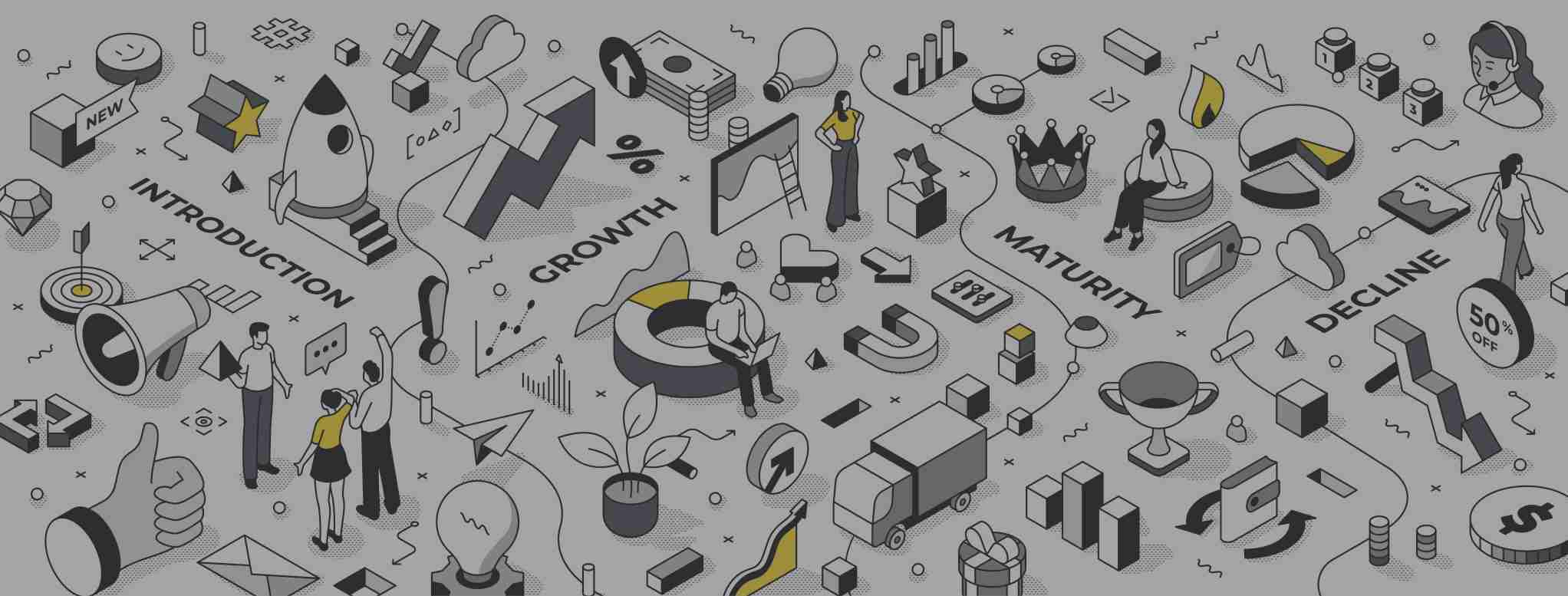In the rapidly evolving landscape of SAAS and fintech, B2B lead generation remains a cornerstone for marketing teams aiming to drive growth and secure a competitive edge. As an agency with over 15 years of experience working with SaaS and Fintech teams, we know the right strategies and tools businesses can use to unlock new opportunities and convert prospects into loyal customers.
This blog post delves into effective B2B lead generation strategies, highlighting the role of specialised companies, landing pages, services, and tools in achieving marketing success.
Understanding B2B Lead Generation
Understanding B2B lead generation is crucial for businesses looking to sell their products or services to other companies. It involves identifying potential customers (leads) who have shown interest in your company's offerings and nurturing them through the sales funnel until they are ready to purchase.
The multifaceted process incorporates various strategies and tools to attract and engage these prospects. Strategies can include content marketing, SEO, email marketing, social media engagement, and leveraging B2B lead generation services and tools. Effective lead generation requires a deep understanding of the target audience, including their needs, pain points, and decision-making processes.
Businesses can build trust and credibility with potential leads by providing valuable content and solutions that address these areas. Additionally, measuring and analysing the performance of lead generation activities is essential for refining strategies and improving outcomes.
Ultimately, B2B lead generation is about creating meaningful connections with potential customers, guiding them through the buyer's journey, and converting them into loyal clients.
Strategies for Effective Lead Generation
1. Content Marketing
Content marketing is a pivotal strategy for SaaS and Fintech marketing teams aiming to generate B2B leads effectively. By producing and disseminating high-value content such as blogs, guides, research reports, whitepapers, webinars, and podcasts, these teams can establish their brand as thought leaders in financial technology.
This approach educates and informs the target audience and builds trust and credibility, which are essential in the decision-making process for financial services. Moreover, content marketing supports SEO efforts, driving organic traffic to the company's website and improving online visibility.
By offering content that addresses their audience's pain points and challenges, SaaS and Fintech companies can attract qualified leads, nurture them through the sales funnel, and ultimately convert them into loyal customers.
2. SEO and B2B Lead Generation Landing Pages
SEO and B2B lead generation landing pages are indispensable tactics for SaaS and fintech marketing teams aiming to enhance their lead generation efforts. These teams can significantly improve their search engine rankings by optimising website content with targeted keywords relevant to the SaaS and fintech industries, increasing visibility and attracting more organic traffic.
Furthermore, well-designed B2B lead generation landing pages are crucial in converting this traffic into leads. These landing pages are meticulously crafted with a clear, compelling value proposition and engaging call-to-action (CTA). They are optimised for conversions, encouraging visitors to take the desired action, such as signing up for a trial or downloading a whitepaper.
Together, SEO and effective landing pages create a powerful synergy that draws potential leads to the website and guides them through the conversion process. This makes them highly effective lead generation tactics for SaaS and fintech marketing teams.
3. Email Marketing
Email marketing remains an exceptionally effective lead generation strategy for B2B SaaS and fintech marketing teams due to its direct and personalised approach. In industries where the sales cycles are longer and the products highly specialised, email allows marketers to nurture leads by providing tailored content that addresses each prospect's unique needs and interests.
By segmenting their audience and delivering targeted messages, SaaS and fintech companies can build relationships and maintain engagement over time, gradually guiding potential customers through the sales funnel. Moreover, email marketing campaigns can be easily measured and optimised based on performance metrics, allowing teams to refine their strategies for maximum impact.
The ability to deliver the right message to the right person at the right time makes email marketing a powerful tool for converting prospects into qualified leads and, ultimately, into loyal customers within the B2B SaaS and fintech sectors.
4. Social Media Marketing
Social media marketing is an effective B2B lead generation strategy for SaaS and fintech marketing teams, as it allows them to leverage platforms with large, engaged professional communities, like LinkedIn, to target and connect with potential leads. These platforms offer advanced targeting options, enabling marketers to reach decision-makers and influencers within specific industries, job functions, and seniority levels.
SaaS and fintech companies can increase brand awareness and establish thought leadership by sharing insightful content, participating in industry discussions, and engaging with followers.
This presence fosters trust and credibility and drives traffic to optimised lead-generation landing pages, where your leads can be captured. Additionally, social media platforms provide valuable analytics, giving marketing teams the data they need to refine their strategies and improve ROI.
The interactive nature of social media also encourages direct conversations with prospects, which can lead to more personalised relationships and a higher likelihood of converting these interactions into solid B2B leads.
5. Leveraging B2B Lead Generation Services and Tools
Leveraging B2B lead generation services and tools is a highly effective strategy for B2B SaaS and fintech marketing teams, as it streamlines identifying and engaging potential customers. These services and tools use advanced technologies and data analytics to pinpoint businesses most likely to be interested in a company's offerings, thus increasing the efficiency and effectiveness of lead-generation efforts.
Marketing teams can focus on crafting more personalised and strategic outreach efforts by automating repetitive tasks such as lead scoring, data entry, and follow-up communications. Furthermore, these tools often come with capabilities for tracking and analysing lead behaviour, providing valuable insights to refine marketing campaigns and tailor content to the specific needs and interests of the target audience.
Such specialised services and tools enable SaaS and fintech companies to scale their lead generation activities, optimise their marketing spend, and ultimately drive higher conversion rates, making them indispensable in a competitive B2B landscape.
6. Cold Calling and Direct Outreach
While considered traditional, cold calling and direct outreach can still be effective, especially when targeting highly qualified leads. Sales teams should focus on reaching out to leads that have shown a high level of interest or closely fit the ideal customer profile. Preparing a script that addresses potential pain points and highlights the value proposition of the SaaS or fintech solution can improve the success rate of these calls.
In today’s world, too many sales reps over-rely on email to close a sale, and the best reps focus on qualification, sales-qualified leads of best fit ICP/Persona to maximise their lead generation outcomes. Direct outreach when your prospect is better-qualified leads to better sales results, and that requires more than an email address or phone number.
7. Referral Programs
Implementing referral programs can encourage existing customers to refer new leads to the SaaS or fintech solution. Sales teams can offer incentives for referrals that convert into customers, leveraging the trust and credibility of their existing customer base to attract new leads.
The best B2B companies target referrals as a lead generation tool and use their product experience as the primary lever rather than paying for leads. However, partner programs like HubSpot’s agency program deliver up to $4 billion in revenue, which isn’t to be sniffed at.

How to measure the success of your B2B lead generation strategy
Measuring the success of lead generation strategies for SaaS and fintech companies involves tracking various key performance indicators (KPIs) that provide insights into the effectiveness of marketing efforts and their impact on sales and revenue growth. Here are some practical ways to measure the success of these strategies:
- Conversion Rate: This metric is crucial for understanding how well your lead generation efforts translate into actual leads or customers. It measures the percentage of visitors to your website or landing pages who take a desired action, such as filling out a contact form or signing up for a trial. A high conversion rate indicates that your messaging and offers resonate with your target audience.
- Click-Through Rate (CTR): CTR measures the effectiveness of your call-to-action (CTA) elements, such as buttons or links in emails, ads, or web pages. It is calculated by dividing the number of clicks by the number of impressions (views) and multiplying by 100 to get a percentage. A higher CTR suggests that your content is compelling and encourages engagement.
- Lead Velocity Rate (LVR): LVR tracks the growth rate of qualified leads over time, providing insights into the momentum of your lead generation efforts. You calculate LVR by comparing the number of qualified leads in the current month to those in the previous month. An increasing LVR indicates that your lead-generation strategies are becoming more effective.
- Cost Per Lead (CPL): CPL measures the cost-effectiveness of your lead generation campaigns by dividing the total cost of the campaign by the number of leads generated. This metric helps you understand how efficiently you use your marketing budget and where you might need to optimise spending.
- Return on Investment (ROI): ROI is a critical metric for assessing the overall success of your lead generation strategies in financial terms. It calculates the return from your lead generation efforts relative to the cost. A positive ROI indicates that your strategies generate more revenue than the cost incurred, making them successful.
- Attribution: Understanding which marketing channels and touchpoints contribute to lead generation and conversions is essential for optimising your strategies. Attribution models help you identify the most effective channels and allocate resources accordingly.
- Average Lead Value (ALV): ALV helps you assess lead quality by calculating the average revenue generated per lead. This metric benefits SaaS and fintech companies with varying customer lifetime values, providing insights into the potential revenue impact of your lead generation efforts.
- Time to Conversion: Measuring the time taken for a lead to convert into a customer can provide valuable insights into the efficiency of your sales funnel and lead nurturing processes. A shorter time to conversion indicates that your lead generation and nurturing strategies effectively move leads through the sales funnel.
By tracking these metrics, SaaS and fintech companies can understand the effectiveness of their lead generation strategies, identify areas for improvement, and make data-driven decisions to optimise their marketing efforts for better results.
How HubSpot helps with b2b lead generation for SaaS and Fintech
HubSpot is a powerful tool for B2B lead generation, particularly for SaaS and fintech companies, due to its comprehensive features designed to attract, engage, and delight potential customers throughout the entire sales funnel. Here's how HubSpot aids in B2B lead generation for these sectors:
- Content Creation and Optimisation: HubSpot's blogging tool simplifies content creation and facilitates lead generation with its user-friendly editor, eliminating the need for coding expertise. SaaS and fintech companies can generate leads regularly by consistently publishing insightful content and strategically placing lead capture forms within posts.
- Lead Scoring and Qualification: HubSpot offers lead scoring features that allow companies to prioritise leads based on their engagement and fit for the product. This helps sales teams focus on the most promising prospects, improving efficiency and conversion rates.
- Marketing Automation: HubSpot's Marketing Hub streamlines campaign creation, lead nurturing, and analytics for effective digital marketing strategies. Automation workflows, lead scoring/qualification, personalisation, segmentation, and retargeting are all part of the platform, saving the sales team time and resources.
- CRM and Sales Enablement: HubSpot provides a CRM platform that offers a single source of truth for client information, enabling sales teams to have more informed conversations with leads and track the entire customer journey from initial contact to closed deal.
- Email Marketing: HubSpot's marketing tools are rated highly for their effectiveness in B2B lead generation. The platform allows for creating personalised email campaigns that can be measured and optimised based on performance metrics.
- Social Media Marketing: HubSpot integrates with social media platforms, allowing SaaS and fintech companies to generate leads through channels like LinkedIn. The platform provides tools for publishing content, managing interactions, and tracking engagement.
- Landing Pages and CTA Optimisation: HubSpot's Content Management System enables businesses to create optimised landing pages to convert visitors into leads. A/B testing features help systematically improve these pages for better performance.
- Analytics and Reporting: HubSpot offers robust analytics and reporting features that help companies measure the success of their lead generation efforts. This data-driven approach allows for continuous optimisation of strategies to improve ROI.
- Integration Capabilities: HubSpot's diverse offerings and extensive list of APIs allow for integration with other platforms and tools, making it a versatile solution for managing complex tech stacks and change management processes.
- Customer Service and Support: HubSpot also includes features for collecting customer feedback, integrating support tickets, and analysing customer sentiment, contributing to a holistic approach to lead generation and customer relationship management.
In summary, HubSpot helps SaaS and fintech companies generate B2B leads by providing tools and features that support content marketing, lead management, marketing automation, CRM, and analytics, all essential for a successful lead generation strategy.
How a B2B HubSpot marketing agency can help with lead generation
A B2B HubSpot marketing agency can significantly benefit B2B SaaS and fintech marketing teams by providing specialised expertise in utilising HubSpot's comprehensive suite of tools for an effective lead generation strategy.
These agencies are adept at leveraging HubSpot's CRM, marketing automation, and analytics platforms to create targeted campaigns that attract and nurture high-quality leads.
By employing inbound marketing or demand generation techniques, such as content creation, SEO, and social media marketing, within the HubSpot ecosystem, these agencies can help SaaS and fintech companies attract visitors to their websites and convert them into leads with personalised landing pages and lead capture forms.
Additionally, a HubSpot agency can assist in segmenting leads and automating follow-up communications, ensuring that potential customers receive timely and relevant information that moves them through the sales funnel.
The expertise of a HubSpot marketing agency in these areas can lead to more efficient lead generation processes, better alignment between marketing and sales teams, and, ultimately, a higher ROI for SaaS and fintech companies.
We hope you enjoyed reading this article and that it provided inspiration for your own lead generation strategy and if you are interested in discussing how our team can support you please book some time with us.




